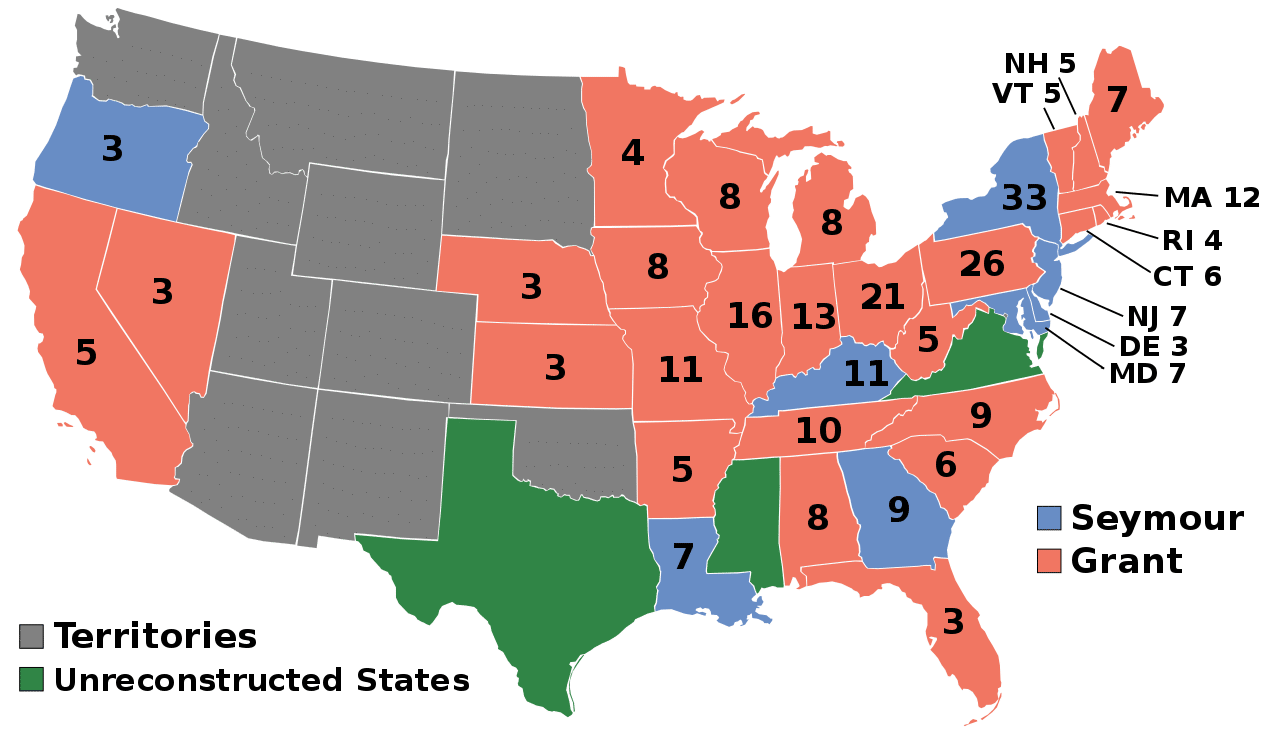The Presidential Election of 1868 was the first election to take place during Reconstruction. This would also be the first election that African Americans would be able to vote in the South.

After the assassination of President Lincoln, Andrew Johnson took over the Presidency. Andrew Johnson was a War Democrat and would go on to clash with most of Congress and eventually was impeached. He would not run for re-election, and the Democrats would need to find another Candidate.
The Republicans would nominate Ulysses S. Grant for the presidency. Grant was a hero and well-known to all Americans. He helped end the war when Robert E. Lee surrendered to him at Appomattox Courthouse in Virginia.
This election would also mark the first time that the Southerners had voted for President since the Civil War.
The Candidates for both parties are as follows:
- Republicans: Ulysses S. Grant and Vice President Schuyler Colfax
- Democrats: Horatio Seymour and Vice President Francis Preston Blair Jr.
Platforms
Republicans: They supported black suffrage in the South as part of the passage to full citizenship for former slaves. It agreed to let northern states decide individually whether to enfranchise blacks. It opposed using greenbacks to redeem U.S. bonds, encouraged immigration, endorsed full rights for naturalized citizens, and favored Radical Reconstruction as distinct from the more lenient policy of President Andrew Johnson.
Democrats: The slogan used for the Democrats during the 1868 election was "This is a White Man's Country, Let White Men Rule." The slogan is all one needs to hear to know what they stood for. This was the return of Southern voters to the election process, and the tended to side with Democrats. They opposed black suffrage and believed that Reconstruction should be done at the state level.
Outcome
The Presidential Election of 1868 was decided by how America wanted to pursue Reconstruction.
The Democrats campaigned that the states should have control over their own reconstruction without the Federal Government's involvement.
The Republicans tended to want a stronger Federal Government to oversee the reconstruction of the South.
Grant took no part in the campaign and made no promises. The Republican campaign theme, "Let us have peace," was taken from his letter of acceptance. After four years of civil war, three years of wrangling over Reconstruction, and the attempted impeachment of a president, the nation craved the peace Grant pledged to achieve.
Seymour suffered a series of personal attacks from the Northern Papers. One had said he was a corpse, just like James Buchanan, who had just died. He was accused of being disloyal to the Union, a friend of Confederates, and many other terrible accusations.
In the end, Ulysses S. Grant won the Presidency in an electoral landslide. However, it surprised many at how close the popular vote was between the national hero and Seymour.
Democrats in the South had worked hard, but Republican regimes controlled the election machinery and carried every state there except Georgia and Louisiana, where Ku Klux Klan activity affected Republicans' ability to express their opinion.
